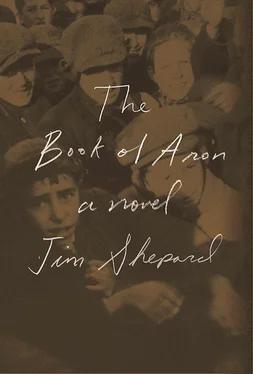That night Gieńa’s older brother Samuel visited before curfew and she threw herself on him and the kids gathered around and stared. Madame Stefa and Korczak watched with their arms folded. Gieńa’s brother told her he had to talk to Korczak and Madame Stefa and she waited with her friends in the main room while he sat with them in the kitchen. The glass was still where they’d left it, though someone had drunk the tea. I sat in the hall by the doorway.
The brother told them he’d heard the orphanage wouldn’t be touched but that he couldn’t be sure and had promised his mother to watch over his sister and that lately his nightmares had convinced him they should be together, given what was happening. But he hardly knew the couple he lived with and worried that his sister would be terrified to be alone all day while he worked.
He waited but Korczak was silent. Madame Stefa finally said they too believed the orphanage would be safe and that taking children away wasn’t good for the group’s morale, though this was his decision.
So he talked with his sister and she couldn’t decide but eventually left with him the next morning. But the morning after that he brought her back, because of what she’d heard when she’d been locked alone in his room. He brought her back in time for breakfast and sat her at her place. He wiped his eyes and promised he would visit when he could, and she told him he’d been very helpful and should take care of himself. Then she picked up her spoon and turned away. After he left Madame Stefa asked why Korczak was waiting tables and he told her he liked to keep occupied and by picking up soup bowls and spoons and plates he could see who was sitting next to whom. And who was most alone.
THAT NIGHT AFTER EVEN KORCZAK HAD FALLEN asleep there was a low rapping at the back door and when I took the lamp over to it and threw the bolt open Boris shoved me back and he and the other boy stepped in and shut the door behind them.
“How can we help you gentlemen?” Korczak said. He was in his nightshirt and without his glasses.
“Come into the kitchen,” the other boy said, and took the lamp from me and led us there.
They sat at the table and we stood in front of them. “Hello again,” I said to Boris.
“Hello,” Boris said.
“Yes, it’s nice to be back,” the other boy said. Then he told Korczak that representatives of the youth movements had met and established the Jewish Fighting Organization and had decided their first task was to inform everyone that the deportations were to a camp at Treblinka where everyone was to be gassed. They were already distributing flyers but the flyers were being destroyed by the Judenrat, who viewed them as a German provocation intended as a pretext to shoot everyone.
“If everyone’s being gassed then how has this information reached you?” Korczak asked.
One or two who’d escaped from the trains came back to the ghetto every week, the boy told him.
“And these people are reliable?” Korczak asked. “How did they achieve this feat?” I asked if he wanted me to fetch his glasses and he said no.
“In my case I managed to tear the barbed wire from the window and wriggle through,” the boy said. When he saw Korczak’s face he added, “I’m not Hercules. Others ahead of me worked at it and ran out of time.”
They stared at each other. I thought: that’s what I would do. I’d climb over heads if I had to.
“Others kicked out floorboards or sideboards,” the boy said.
“While the train was still moving?” I asked, but the boy gave me such a look that I shut up.
“Are there no guards on the trains?” Korczak asked.
“There are guards,” the boy said. “Some who get away are shot and some aren’t.”
Korczak seemed unsurprised by any of this. “And you’re a member of this fighting organization?” he asked.
The boy said they’d come for two reasons and the first was to help Korczak escape.
The Polish underground was always offering to help him escape, Korczak told him, but he always said no unless they could take everyone.
“They want you because you’re the only one they consider a Pole,” the boy said. “But we want to get you out not just because you’re the famous Dr. Korczak. We want you to help spread the word about what’s going on.”
“Why would anyone listen to me?” Korczak said.
The boy didn’t answer. “Tell him,” he said to me.
“Tell me what?” Korczak said. And all three of them looked at me.
“They’re also here because they want my help,” I told him. “I said if they wanted me to help them they had to do this for me.”
“Do what for you?” Korczak asked. His expression was so surprised and disappointed that I had to look away.
“Get you out,” Boris said. He said the Germans were directing their resettlement from an office on Żelazna. He said Lejkin was the Jew in charge and that I had worked as an informer for him and the Gestapo, which meant I could get inside. And since I could get inside, then I could help them attack it when the time came.
“You want him to help you attack their office?” Korczak asked.
“His price was getting you out,” the other boy said.
“When was all this arranged?” Korczak asked me.
“They came to the home yesterday,” I told him. “I talked with them on the front step.”
“When did you imagine you would do this?” he asked me, in the voice he used when he talked to the Germans.
“He’ll have to come now,” Boris said.
“I’m not doing anything until he’s out of the ghetto,” I told them.
“Do you have guns? Do you have bombs?” Korczak asked.
“We’re getting guns. We’re getting bombs,” Boris said.
“From where?” Korczak asked.
Boris finally told him that his plan was for me to bring him to the wall at the end of Próżna Street at four the following night and there would be a ladder and someone waiting on the other side to take him out of the city.
Korczak walked to the sink and stood with his back to us. “I’m waiting to speak until I’m not so angry,” he said.
The other boy moved the tea glass from spot to spot on the table like a chess piece. When I looked at Boris he only shrugged.
Korczak turned around. “And all the children in this orphanage?” he said to me. “I’m going to leave them now, when they have so little time left?”
I put my hands on my face. “I just wanted to save you,” I said.
The other boy said, “Boris chose the spot along the wall from your smuggling days. He picked a good one.”
“When they argue with one another the children have a saying,” Korczak finally told us. “They say, ‘I’ll give you away in a bag.’ ”
“Tell them the truth,” the boy said. “Tell them we can’t save them.”
“Tell them they’re all just on their own?” Korczak asked, and his anger surprised even them.
“They are all on their own,” the boy said.
“They’re not all on their own,” Korczak said. None of us could look at anyone else.
“So you won’t go?” the boy finally said to Korczak. “And you won’t help us if he doesn’t go?” he said to me.
My hands were still on my face. Madame Stefa was now standing in the doorway.
“Maybe he’ll change his mind,” I said.
“But you have to come now,” Boris said.
“And just leave him? And everyone else?” I asked.
“Aron’s not a violent boy,” Madame Stefa said. She cleared her throat and said it again.
“Sh’maya? Don’t tell me about Sh’maya,” Boris said. “Because of him my two best friends are dead. Sh’maya doesn’t care about anyone but himself. Do you, Sh’maya?”
The other boy got up from the table and looked sad when he put the glass in the sink. “So you’re going to do as you’re told,” he said to Korczak. “And make everything simpler for the Germans.”
Читать дальше












